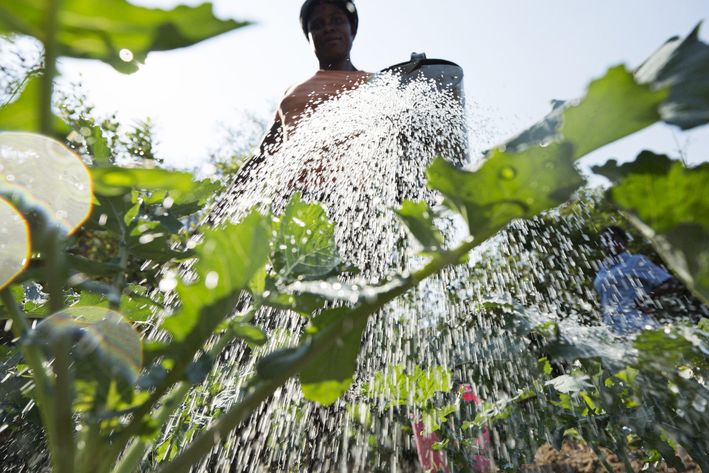How do we ensure healthy diets? Steer agriculture towards climate resilient food production? Design food systems in order for everyone to have access to sufficient, affordable, and nutritious food? And most importantly – how do we finance it?
These were some of the big questions that panellists and participants at the event “Financing a sustainable food future” discussed during the 53rd session of the Committee on Food Security in Rome. An event that DanChurchAid co-hosted with UN Nutrition, Decent Work Coalition, IFAD, Ministry of Agrarian Development and Family Farming Brazil and other partners.
The event was opened by Natasha Hayward from the World Bank Global Agriculture and Food Security Program who painted a rather sombre backdrop to the conversation highlighting that we are far off track to achieve a sustainable and resilient food future – and that coherent policies, aligned investments and complimentary programming can bend the curve on emissions, build resilience, and improve health and equity.
And fortunately, there are many examples of initiatives that work towards creating a foundation for a sustainable food future – from Brazil to Sierra Leone and from Egypt to Uganda.
Strengthening the value chain
In Uganda, DanChurchAid works to increase the competitiveness of smallholder farmers in agricultural value chains by carving out a niche for them as agroecological farmers
This attracts private sector investment into agriculture production, by enabling off-takers to buy more produce from the farmers and ensures that the agroecological farming practices contribute to safe and nutritious crops and a healthy environment.
At the event DanChurchAid’s Programme Manager for Building Resilient Communities in Uganda, Mary Bekunda Kobusingye, shared insights from DCA’s work with the SoilCycle Fund in the country.
The SoilCycle Fund
With funding from the Danish Ministry of Foreign Affairs DCA has partnered with SHONA, an impact investor and business accelerator, through a contribution to a facility that boosts capital needs for businesses run by small- and medium size entrepreneurs (SMEs) engaged in the agricultural value chains – the SoilCycle Fund.
The businesses are offered affordable credit, allowing them to buy from and provide reliable markets for smallholder farmers. This in turn enables the businesses to meet – and stimulate – the market demand for smallholder farmers’ agroecological produce.
The SoilCycleFund combines public and private funding in a so-called blended finance model.
From conventional farming to agroecology
Smallholder farmers in Uganda are mostly subsistence farmers. DanChurchAid supports their transition from conventional agricultural practices into more productive, and sustainable agroecological farming practices. The envisioned result is a resilient local food system where small-scale farmers contribute to increased food security by supplying markets with nutritious and healthy food crops.
Reaping profits
And it is working, says Mary Bekunda: “So far, we have shown that agroecological models are profitable. Farmers who have been the main consumers of their own produce, can now expand and sell a much larger portion of what they produce.”
But that’s not all. Agroecology is a nature-based solution – and while organic produce is healthier to consume, the benefits are many more.
“Agroecology farming restores the environment and feeds the people. It conserves water and improves soil health and increases yields.,” says Mary Bekunda.
She says that conventional farming methods are still dominant in Uganda, but increased health dangers – for farmers as well as for the consumers – stemming from the use of chemicals has triggered a change in attitudes and some people are taking more interest in how their food is grown. Not only the price of it.
Empowering small-scale farmers to feed our planet in the future
“We need to continue to create awareness among the consumers so that they understand how their choices affect their health but also our nature. We also need to scale up investments in agroecology and smallholder farmers to ensure that healthy food products are in sufficient supply – and are affordable so they can compete with products that are grown using conventional methods on large farms. It is smallholder farmers that feed the world – and we must support them,” says Mary Bekunda.
She adds that investments should be made responsibly observing responsible business conduct principles to ensure that businesses involved create economic and social value for all actors in the value chain – and concludes that including small-scale farmers by giving them access to markets and investing in the value chains can strengthen smallholder participation in the same value chains and promote fairness.
“It’s already happening. Now we must scale it”
The closing remarks at the ‘Financing a sustainable food future‘ event in Rome were delivered by Rick van der Kamp from the International Fund for Agricultural Development (IFAD) who echoed the sentiments shared by Mary: “Invest with intentionality. Empower local actors. Partner across sectors. Transformation isn’t theoretical – it’s already happening. Now we must scale it up and sustain it.”
The event
On Tuesday 21 October at the 53rd session of the Committee on World Food Security, DanChurchAid co-hosted the event “Financing a sustainable food future” with UN Nutrition, Decent Work Coalition, IFAD, Ministry of Agrarian Development and Family Farming Brazil and other partners – with support from the Embassy of Denmark in Italy.
The panel discussions were guided by Christine Campeau, Global Policy Director of Food and Nutrition Systems at CARE and included voices from:
- Natasha Hayward, Program Manager, Global Agriculture and Food Security Program (GAFSP)
- Fernanda Machiaveli, Vice Minister of the Ministry of Agrarian Development and Family Farming, Brazil
- Nenebah Adama Jalloh, National Coordinator Scaling Up Nutrition and National Curator Food Systems Coordination Unit, Sierra Leone
- Hossam Abd el-Ghaffar, Minister Assistant for Institutional Reform, Egypt
- Peter Taksoe-Jensen, Ambassador of Denmark to Italy, Malta and San Marino and Permanent Representative for Denmark to FAO, World Food Programme and International Fund for Agricultural Development (IFAD)
- Mary Bekunda Kobusingye, Programme Manager, Build Resilient Communities, DanChurchAid Uganda
- Rick Van Der Kamp, Lead Global Technical Specialist for Markets and Value Chains, IFAD.


